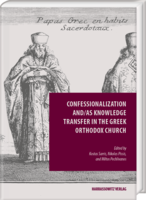|
|
more titles of the subject:
This volume examines the potential of the confessionalization concept for the purposes of a history of knowledge regarding the clerical milieus of the early modern Greek Orthodox Church. Its point of departure is an understanding of confessionalization processes as an epistemic challenge that opened up a field of inter-confessional communication. On the one hand, communication born out of this epistemic challenge – and Orthodoxy’s need to articulate novel, authoritative positions in order to respond – resulted in epistemic movements that shaped confessional boundaries, intellectual profiles and academic curricula. In this sense, confessionalization functioned as knowledge transfer. On the other hand, confessionalization may be perceived as the very context of an unfolding communication process that triggered knowledge mobility in a wide range of epistemic fields, beyond the strictly theological: confessionalization and knowledge transfer. The volume comprises studies on conflict, negotiation and modification of knowledge, on interpersonal networks and networks of books, on genres and discourses in motion, on materialities and medialities of knowledge transfer, on accommodation strategies and institution-building processes in the Greek Orthodox Church, and, last but not least, on fluent confessional identities and trans-confessional discourses in clerical milieus.
|






